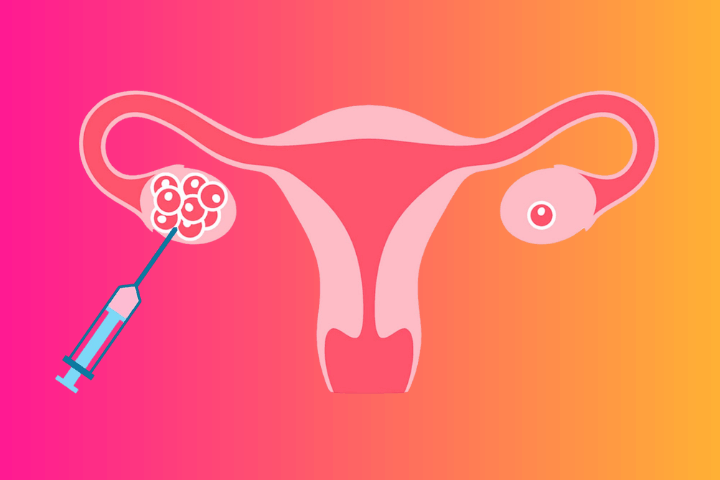Reciprocal IVF, also known as co-maternity or partner-assisted reproduction, is a beautiful option for LGBTQ+ couples—especially lesbian couples and some trans individuals—who want to share the experience of creating a family. It is one of the few fertility treatments that allows both partners to physically participate in the process of conceiving and carrying a child.
💛 What Is Reciprocal IVF?
Reciprocal IVF involves one partner providing the eggs, while the other carries the pregnancy. Donor sperm is used to fertilize the eggs through in vitro fertilization (IVF). Once the embryo is ready, it is transferred into the uterus of the partner who will carry the baby.
This approach allows both partners to be physically involved—one has a genetic connection, and the other experiences pregnancy and birth. For many, this shared role is deeply meaningful and strengthens their emotional bond.
🧬 How Does Reciprocal IVF Work?
Here’s a step-by-step look at what to expect:
-
Fertility Testing & Counseling
Both partners begin with fertility assessments and health screenings. This helps the clinical team counsel the couple how they can be most successful in achieving pregnancy. Age, medical history, and reproductive health all play a role in determining the best path forward. Emotional and legal counseling is also encouraged to navigate decisions and protect both partners’ rights.
-
Ovarian Stimulation & Egg Retrieval
The partner providing the eggs will take fertility medications to stimulate the ovaries to produce multiple mature eggs. Once the eggs are ready, they are retrieved using a minimally invasive outpatient procedure under light sedation.
-
Fertilization
The retrieved eggs are then combined with donor sperm in a lab, using one of two methods:
- Conventional insemination: Sperm and eggs are placed together to fertilize naturally.
- ICSI (intracytoplasmic sperm injection): A single sperm is injected directly into an egg—used when there are specific sperm-related issues.
-
Embryo Development
Fertilized eggs grow into embryos in a specialized incubator that mimics the condition of the human body. Embryos are carefully monitored for several days.
-
Optional Genetic Testing
Couples may choose preimplantation genetic testing (PGT) to check embryos for chromosomal abnormalities. This can reduce the risk of miscarriage and increase the chances of a healthy pregnancy.
-
Embryo Transfer
An embryo is selected and gently transferred into the uterus of the partner who will carry the baby. This step is typically quick and painless, and sedation is not usually needed.
-
Pregnancy & Birth
If the transfer is successful, the pregnancy progresses like any other. Prenatal care continues with your regular OB-GYN.
💖 Benefits of Reciprocal IVF
- Shared Experience: Each partner plays a role in building the family, creating a powerful emotional bond.
- Genetic Connection: One partner is biologically related to the child, which may be an important factor for some families.
- Stronger Partnership: Many couples say the shared process brings them even closer together as they prepare for parenthood.
Some couples even do dual reciprocal IVF, where each partner carries the other’s embryo at the same time—or they switch roles for a second child.
⚖️ Legal and Emotional Considerations
Even though reciprocal IVF is a medical process, there are legal and emotional factors to keep in mind:
- In some states, the egg provider may need to legally adopt the child to be recognized as a parent—even if they are biologically related.
- Couples are strongly advised to consult with an attorney familiar with LGBTQ+ family law and IVF-specific laws in their state.
- Fertility clinics may also recommend counseling to help couples prepare emotionally for the journey.
💸 What About Cost and Insurance?
Insurance coverage varies widely. Some plans offer partial or full coverage, while others do not cover fertility treatments at all. It is important to check with your insurance provider to understand your benefits.
If your insurance does not provide coverage, reciprocal IVF can be costly, typically ranging from $20,000 to $40,000 or more per cycle, depending on your clinic, medications, and whether additional services like PGT are used.
🔍 Common Questions
Can you make a baby with two eggs?
No. Eggs require sperm to fertilize. While reciprocal IVF allows both female partners to participate, donor sperm is still needed to create an embryo.
Do both partners need hormone treatments?
If you are doing a fresh transfer, both partners may take hormones to synchronize their cycles. With frozen embryos, the timing is more flexible and medication protocols may be simpler.
Is reciprocal IVF safe?
Like all medical procedures, there are risks—including side effects from fertility medications, egg retrieval, and potential complications during pregnancy. Your fertility specialist will go over these with you in detail.
🌈 Final Thoughts
Reciprocal IVF offers LGBTQ+ couples a unique and fulfilling path to parenthood. By allowing both partners to participate in creating and carrying their child, it fosters a deeper connection and shared joy throughout the process.
If you are dreaming of building a family together, reciprocal IVF might be the perfect option to explore. Talk to a fertility specialist who understands your needs and can guide you through this exciting journey with care and compassion.
If you would like to learn more about GENESIS Fertility New York or are ready to schedule an appointment, please speak with one of our representatives at 929-605-5467.





